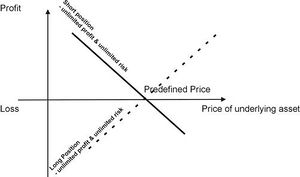Futures
| Futures |
|---|
| See also |
Future is an contract to either buy or sell an asset at specified price on a given date in the future. In other words, it is a commitment to buy or sell a specified quantity of commodity or financial instrument at a price established now, but payment and delivery occur at a specified future date. The commodities can be: gold, oil, cattle, frozen orange juice. Financial instruments can be: currency, bonds, index. Futures are exchange traded.
Trading
The buyer of futures contract, takes "long position", agrees to receive delivery.
The seller takes "short position" and is obliged to make delivery. If you think that the price of your stock will be higher than it is today, you want to go long. If you think the stock price will be lower than you'll go short. Future contracts are marked to market and they require daily settlements of gains and losses as long as the contract remains open. It is a zero sum game - the short positions exactly offset the long positions. The short side's profit or loss is the long side's loss or profit. However, initially both buyer and seller are obliged to make a payment * called "margin", which act like security deposit to ensure contract performance. They usually constitute small percentage of the value of underlying asset. A typical margin can be anywhere from 10 to 20 percent of the price of the contract.
See also:
Examples of Futures
- Agricultural Commodities: Agricultural commodities futures are contracts to buy or sell a certain amount of an agricultural product at a predetermined price on a certain date in the future. Examples of agricultural futures include corn, soybeans, wheat, cotton, and orange juice.
- Currency Futures: Currency futures are contracts to buy or sell a certain currency at a predetermined price on a certain date in the future. Examples of currency futures include the Euro, U.S. dollar, Japanese yen, and British pound.
- Equity Index Futures: Equity index futures are contracts to buy or sell a certain equity index at a predetermined price on a certain date in the future. Examples of equity index futures include the S&P 500 Index, Nasdaq 100 Index, and Dow Jones Industrial Average.
- Interest Rate Futures: Interest rate futures are contracts to buy or sell a certain interest rate at a predetermined price on a certain date in the future. Examples of interest rate futures include U.S. Treasury bonds and Eurodollar futures.
Advantages of Futures
Futures are an important tool used by investors and traders to manage risk and take advantage of price movements. Below are some of the major advantages of futures:
- Reduced Risk: Futures trading enables investors to limit their risk by providing the ability to buy or sell a specific quantity of an asset at a predetermined price. This helps to reduce potential losses and ensure that investors are not exposed to more risk than they are comfortable with.
- Leverage: Futures trading provides investors with the ability to leverage their investments, meaning that investors can control a larger position with a smaller amount of capital. This can mean greater returns, but also greater risk.
- Flexibility: Futures contracts are flexible and can be tailored to the individual investor's needs. Investors can choose the specific asset, expiration date, and size of the contract that best fits their investment strategy.
- Trading opportunities: Futures markets provide investors with a wide range of trading opportunities, including the ability to speculate on the direction of price movements. This can be beneficial for investors who are looking to capitalize on short-term price movements.
Limitations of Futures
- Futures can be highly volatile and risky investments. They are subject to sudden price changes due to market forces and may cause traders to incur losses if they are not careful.
- Futures contracts are illiquid, meaning they cannot be easily converted into cash. Once a contract is bought, traders are stuck with it until it matures or is sold.
- Futures contracts are also subject to counterparty risk. This means that if one party to the contract defaults, the other party is not guaranteed to receive their funds or assets.
- Margin requirements for trading futures are often higher than for other types of investments. This can limit liquidity and make it difficult for traders to enter and exit positions.
- Futures markets are complex and require a high level of expertise to understand and trade in. Inexperienced traders may find it difficult to navigate the markets and may incur heavy losses.
- Options: Options are another derivative instrument that provide the right to buy or sell an asset at a predetermined price (strike price) on or before the expiration date.
- Forward contracts: Forward contracts are private agreements between two parties, where the buyer agrees to purchase an asset and the seller agrees to sell it at an agreed-upon price at a future date.
- Swaps: Swaps are agreements between two parties to exchange cash flows at predetermined intervals over a specified period of time.
- Futures spread: A futures spread is when two or more futures contracts are combined to create a spread trade.
In summary, futures are a type of derivative instrument used to hedge against or speculate on the price of an asset at a future date. Other derivatives such as options, forward contracts, swaps, and futures spreads can also be used for hedging or speculation.
References
- Futures, options, and swaps Robert W. Kolb, Blackwell Pub 2003, p. 13, 80-82
- Financial risk manager handbook Philippe Jorion, GARP. Hoboken: John Wiley & Sons 2005, p. 117-199
- Galloway, T. M., & Kolb, R. W. (1996). Futures prices and the maturity effect. Journal of Futures Markets, 16(7), 809-828.
Author: Katarzyna Wierzbinska
